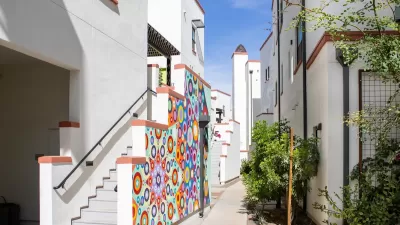The Hollywood Park horseracing track in Inglewood, California, follows the path of racetracks in Sam Mateo and Queens that have recently given way to large housing developments.
"At the end of December an era came quietly to an end in Los Angeles. Inglewood’s Hollywood Park, once one of the premier racetracks in the United States—it hosted famous horses like Seabiscuit and Seattle Slew—held its last race, closing its doors after more than 70 years in operation," writes Sam Lubell.
What will replace Hollywood Park has one foot in the future and one foot in the past. Developer Wilson Meany has broken ground on a massive new development called Hollywood Park Tomorrow.
So far at least, the development seems to moving forward with an eye toward a more urban, sustainable arrangement than the subdivisions that dominated the development landscape through much of the 20th century in Los Angeles County. "The heart of the new community will be housing, with 525 mixed-use residential units, 675 single-family homes, 1,500 townhomes, and 1,500 condominiums organized around curving, tree-lined streets. Design guidelines will likely call for modern homes and outdoor elements like roof gardens and terraces, a welcome change for this type of development. 6,000 new trees will be planted for the undertaking, in addition to some saved from the old racetrack. The development will also include a retail center, offices, a hotel, and a small casino."
Local landscape firm Mia Lehrer + Associates, creators of the development's master plan, is said to be "pushing" the development team on issues of sustainability and walkability. Lehrer herself is quoted in the story: "We’re testing the limits…The importance they’re placing on the public realm is very valuable."
FULL STORY: Hollywood Ending

Planetizen Federal Action Tracker
A weekly monitor of how Trump’s orders and actions are impacting planners and planning in America.

Restaurant Patios Were a Pandemic Win — Why Were They so Hard to Keep?
Social distancing requirements and changes in travel patterns prompted cities to pilot new uses for street and sidewalk space. Then it got complicated.

Map: Where Senate Republicans Want to Sell Your Public Lands
For public land advocates, the Senate Republicans’ proposal to sell millions of acres of public land in the West is “the biggest fight of their careers.”

Maui's Vacation Rental Debate Turns Ugly
Verbal attacks, misinformation campaigns and fistfights plague a high-stakes debate to convert thousands of vacation rentals into long-term housing.

San Francisco Suspends Traffic Calming Amidst Record Deaths
Citing “a challenging fiscal landscape,” the city will cease the program on the heels of 42 traffic deaths, including 24 pedestrians.

California Homeless Arrests, Citations Spike After Ruling
An investigation reveals that anti-homeless actions increased up to 500% after Grants Pass v. Johnson — even in cities claiming no policy change.
Urban Design for Planners 1: Software Tools
This six-course series explores essential urban design concepts using open source software and equips planners with the tools they need to participate fully in the urban design process.
Planning for Universal Design
Learn the tools for implementing Universal Design in planning regulations.
Heyer Gruel & Associates PA
JM Goldson LLC
Custer County Colorado
City of Camden Redevelopment Agency
City of Astoria
Transportation Research & Education Center (TREC) at Portland State University
Camden Redevelopment Agency
City of Claremont
Municipality of Princeton (NJ)




























